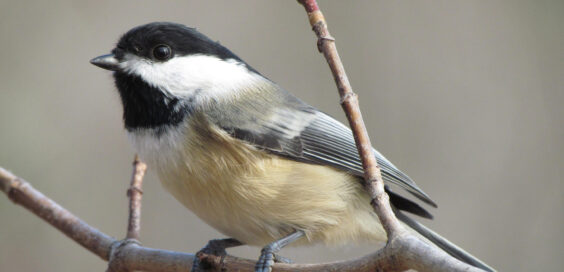
Creature Feature – Tiny But Tough
Posted by Dustin Horton // January 10, 2022 // Articles, Creature Feature
The black-capped chickadee is a wee winter warrior. It weighs about as much as a handful of paperclips but can survive frigid temperatures thanks to some amazing adaptations. For starters, its plush winter plumage helps trap body heat and keep out the cold. The chickadee is also choosy about where it sleeps, preferring a well-insulated roosting nook.
During a typical winter day, the black-capped chickadee revisits many different places where it hid seeds previously, tucked one by one under tree bark or in tree crotches. It finds its hidden stashes thanks to a remarkable capacity for memory that actually increases during the winter months.
In addition to seeds, the chickadee also eats berries, insects and their eggs and larvae, and occasionally bits of carrion. It gorges itself, gaining an additional 10 percent or more of its body weight each day before going to roost. During a long, cold winter night, the chickadee endures hypothermia and a reduced metabolic rate. It shivers to generate heat, and by the next morning, the excess fat it consumed the day before is burned off.
Despite common belief, feeding chickadees doesn’t make them dependent on us. They relish black-oil sunflower seeds, suet and peanut butter, and these high-fat offerings can give them a much-needed boost during severe cold.
Article & photo by Margie Manthey













